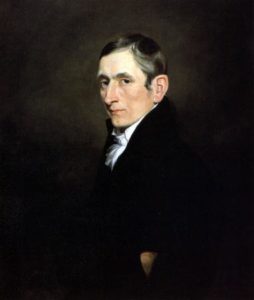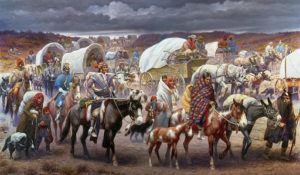
The story of the treatment of America’s native peoples is an ugly chapter in American history. Among its many tragedies, President Andrew Jackson’s “Indian Removal” policy is notorious. In the 1830s with the backing of the U.S. Congress, Jackson effected the forced relocation of the Cherokee from their ancient ancestral lands in what is now parts of Georgia, Tennessee, and Alabama to a reserve in Oklahoma. The “Trail of Tears” is the heartrending name for the suffering endured by native American peoples on the infamous route to the reserve. Many died along the way from exposure, disease, and starvation.

Jeremiah Evarts by Samuel Finley Breese Morse, Oil on Canvas, 1817.
This incident is a low-water mark in American liberty, but it didn’t have to be this way, and there were courageous people of faith who tried to stop it. Arguably most influential among them was Jeremiah Evarts (1781-1831). Evarts came to Christian faith during the Second Great Awakening while a student at Yale. Forgoing a career in law, he went on to help establish and eventually lead the American Board of Commissioners for Foreign Missions (ABCFM), one of America’s early missionary organizations whose global outreach included India, Ceylon, the Hawaiian Islands as well as native American peoples.
Although its evangelistic approach was paternalistic in its efforts to Christianize and civilize native Americans, the ABCFM was staunchly committed to equal human rights for the Cherokee. As head of the ABCFM, Jeremiah Evarts was the leading national vocal opponent of Andrew Jackson and his policy of removal. Writing twenty-four opinion editorials under the pseudonym of William Penn (Pennsylvania’s founder famed for his friendly Treaty of Shackamaxon with native Americans), Evarts’ essays were carried by major newspapers to over 500,000 readers including the politically powerful subscribers of Washington, D.C.’s National Intelligencer. Evarts’ biblically informed moral and legal arguments were used in congressional debates against the proposed “Indian Removal Act” and, as some historians argue, later influenced the legal reasoning of U.S. Chief Justice John Marshall. One historian calls Evarts’ essays “the holy writ, the reference work, and the legal brief of the many preachers, congressmen, and lawyers” and another says, they were “the reservoir from which all the opponents of removal drew.”

The Trail of Tears by Robert Lindneux, Oil on Canvas, 1942.
The unfortunate outcome in 1830, however, was a narrow victory for Jackson’s policy in the Congress – 104 votes in favor of removal with 97 members opposed. Evarts died the following year, although a legal challenge to the Indian Removal Act led by Evarts’ ABCFM missionary colleague, Samuel Worcester, was successful in positively influencing the Supreme Court in favor of the Cherokee. Worcester v. Georgia (1832) became a landmark case for native American rights, but not until later, because Jackson refused to enforce the Court’s decision. Thus, the dye was cast for tragedy. Yet, it was people of faith – missionaries, Cherokees, and others whose biblically informed ideals of humanity animated them to speak out and act for ideals of liberty and justice for all.
For further reading:
- From Revivals to Removal: Jeremiah Evarts, the Cherokee Nation, and the Search for the Soul of America by John A. Andrew
- What Hath God Wrought: The Transformation of America, 1815-1848 by Daniel Walker Howe